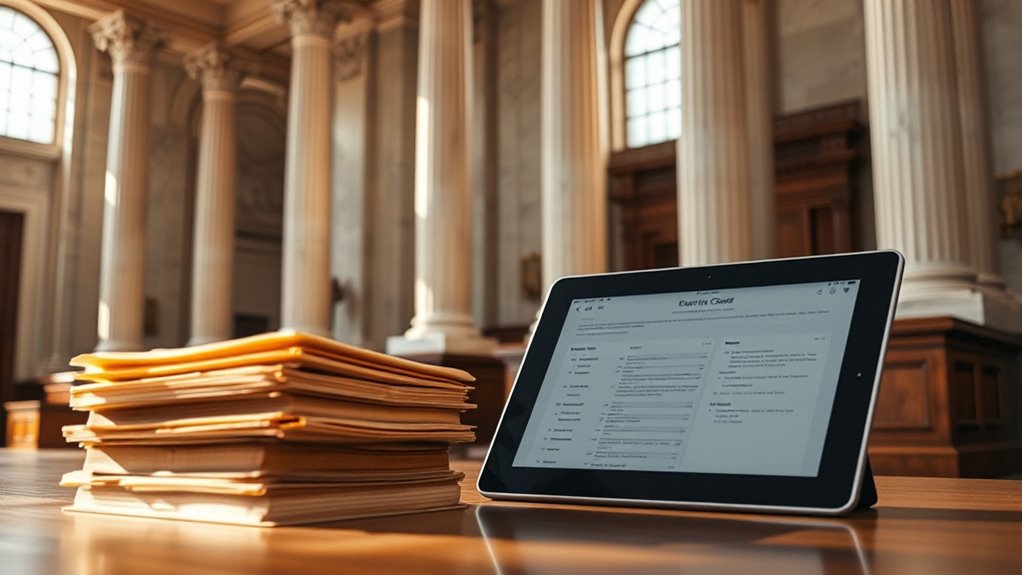You can access some court records online for free because courts want to promote transparency and allow the public to view case details easily. However, others cost money due to privacy restrictions, operational costs, or the need to protect sensitive information. Fees often cover redacting personal data or maintaining systems. If you want to understand how courts balance openness with privacy and costs, there’s more to explore ahead.
Key Takeaways
- Free online records promote transparency and public access but may be limited to protect privacy and sensitive information.
- Full access often requires payment to cover costs of redacting, reviewing, and maintaining official documentation.
- Older or sensitive cases are restricted or require authorization, leading to tiered access levels.
- Digital systems and automation reduce costs but influence the availability of free versus paid records.
- Paid options provide comprehensive, official, or historical records necessary for legal or research purposes.

Have you ever wondered whether court records are available for free or if you need to pay to access them? The truth is, the availability and cost of court records vary widely depending on several factors. One key reason some records are free online is to promote transparency and public access. Many courts and government agencies aim to make information about legal proceedings, criminal cases, and civil disputes accessible to everyone, regardless of income. To achieve this, they often provide free online portals where you can search for case details without paying a fee. These free resources are especially helpful for journalists, researchers, or individuals tracking case histories without needing to navigate complex paywalls.
Many court records are free online to promote transparency and public access.
However, it’s not always straightforward. Accessibility barriers can sometimes limit the availability of free records. For example, older or more sensitive cases might be restricted or require special authorization to view. Courts also have to balance transparency with privacy concerns. Some records contain personal information—like addresses, social security numbers, or medical details—that could be misused if freely accessible. As a result, courts often restrict access or redact sensitive data, which can lead to a tiered system where some records are free but incomplete, and others require a fee for full access.
Privacy concerns play a significant role in why some court records aren’t free. Courts have a duty to protect individuals’ privacy, especially in cases involving minors, victims of domestic violence, or sensitive civil matters. To prevent identity theft, harassment, or further trauma, they impose restrictions and charge fees for detailed records. These fees help cover the costs of redacting or reviewing documents before release. Sometimes, courts only provide limited information for free, with full access requiring payment. This system helps ensure that sensitive information doesn’t fall into the wrong hands while still allowing public access to non-confidential records.
Additionally, the costs associated with maintaining court records—such as digitization, storage, and staff time—are often passed on to the user. Paid access might include thorough search capabilities, official copies, or archived documents that aren’t available for free. These fees help courts sustain their record-keeping systems and ensure accuracy. While free online records serve the public interest, paid options cater to those needing official, complete, or historic documents. So, whether records are free or costly depends on a complex balance of transparency, privacy, and operational costs, shaping the landscape of accessible court information. Furthermore, some jurisdictions utilize automated record systems to streamline public access and reduce costs, influencing the availability of free records.
Frequently Asked Questions
How Can I Determine if a Specific Court Record Is Free or Paid?
To determine if a specific court record is free or paid, start by checking the court’s official website, which usually provides details on record accessibility and fee structures. Look for the record you’re interested in and see if there’s an option to view or download it for free. If not, verify if a fee applies, as some courts charge for access, while others offer free records through online portals or public records databases.
Are There Differences in Access to Federal Versus State Court Records?
Think of federal and state court records as different rivers fed by distinct streams. Federal records, often guarded by stricter Court Privacy rules, tend to have more limited Record Accessibility, making them harder to access and sometimes costly. State records usually have fewer restrictions, offering easier access. Your ability to view these records depends on jurisdiction-specific policies and privacy laws, which shape how freely you can access court information.
Do Fees Vary Depending on the Type of Case or Record?
You’ll find that case fee structures and record access policies vary depending on the type of case or record. For example, criminal records might have different fees compared to civil cases, and some records could be free while others cost more. Courts set these fees based on record sensitivity, public access policies, and administrative costs. Always check the specific court’s fee schedule to understand what charges apply to your case or record request.
Can I Access Court Records for Free if I Visit the Courthouse in Person?
Did you know that over 90% of court records are publicly accessible? If you visit the courthouse in person, you can often access court records for free, as part of public access and court procedures. However, be prepared for some delays or restrictions, especially with sensitive cases. In-person visits usually offer quicker, direct access, but rules vary by jurisdiction, so check beforehand to confirm you can view what you need.
Are Online Court Records Always Complete and Up-To-Date?
You might wonder if online court records are always complete and current. While they often are, privacy concerns can limit what’s available, and record accuracy isn’t guaranteed—errors happen. Check the source’s update schedule and note any restrictions on sensitive information. Remember, online records can be helpful, but for the most reliable info, visiting the courthouse or contacting court officials remains a wise choice.
Conclusion
Think of court records like a vast library—some books are open for all to read, while others are locked behind expensive doors. When you need a record, it’s worth asking why some are free and others cost a fortune. Like uncovering hidden treasures in a dusty attic, accessing certain records can feel like a rewarding discovery. By understanding these differences, you can navigate the system more confidently, saving time and money in your search.









